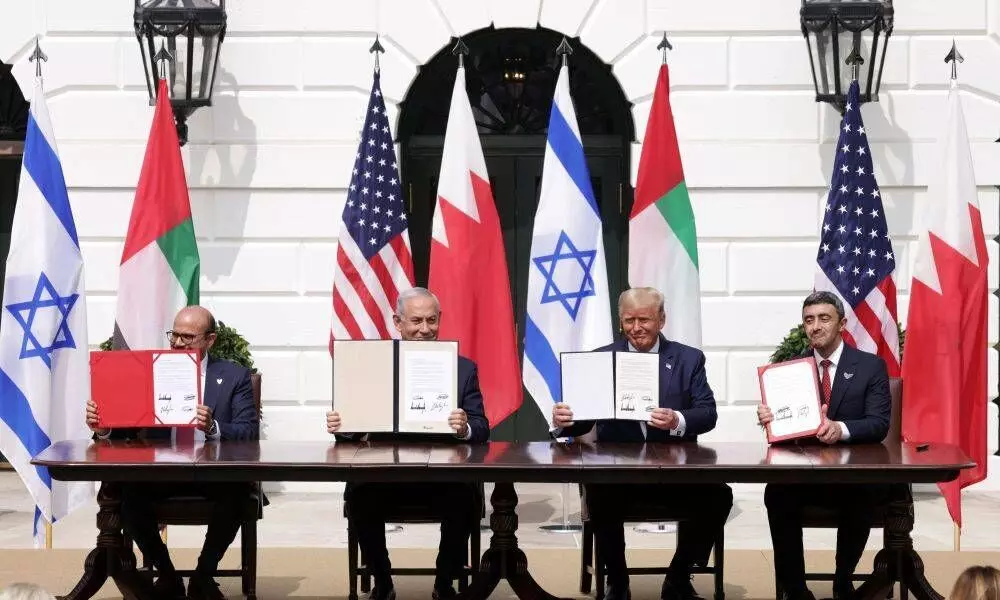Israeli Arab put Gulf allies in awkward position
The storming of the Al-Aqsa Mosque by Israeli police generated outrage across the Middle East
image for illustrative purpose

AS Israel takes stock of the fourth Gaza war, its new allies among the Gulf Arab States are counting the costs of their friendship — and the others are making fresh calculations about signing up to the Abraham Accords. The renewed focus on the plight of Palestinians in the occupied territories and of Arabs within Israel is putting the rulers of the United Arab Emirates and Bahrain in an awkward position and giving pause to their counterparts in places like Saudi Arabia, Qatar and Oman.
The UAE and Bahrain had rational reasons to normalise relations with Israel last fall. For Manama, it was all about Iran. Ever since the late 1960s, when the Shah tried to annex Bahrain, its rulers have looked across the Persian Gulf with dread. The Islamic Republic's support for organised, and sometimes violent, Shiite opposition to the Sunni ruling family greatly intensified their fears. With the US, their traditional protectors, growing ever keener to reduce its exposure in the Middle East, it made sense for Bahrain to ally with Israel, which shares its concerns about Iranian intentions.
The UAE was also mindful of Iranian threats, but it also shared Israel's suspicion of Turkish ambitions; the Emiratis were especially nervous about Ankara's patronage of the Muslim Brotherhood. They also reckoned that signing the Abraham Accords would strengthen ties to the US, in addition to giving them access to Israel's vaunted hi-tech sector.
Both the UAE and Bahrain must have known that their alliance with Israel would from time to time be strained over the treatment of Palestinians and over its claims on Jerusalem. But it is unlikely they could have anticipated such an early — and tricky — test.
It came at the start of May, with a harsh crackdown against Palestinian protesters in Jerusalem. The storming of the Al-Aqsa Mosque by Israeli police generated outrage across the Middle East, even among the politically quiescent populations of the Gulf monarchies. There was trenchant criticism, from Palestinians and other Arabs, of the states that had broken bread with the Israelis.
These sentiments, and their own misgivings, compelled the Emirati and Bahraini governments to issue strongly worded statements condemning Israeli actions in Jerusalem and the mosque.
The pressure on the UAE and Bahrain eased somewhat when Hamas unleashed rocket attacks on Israel, drawing attention away from Jerusalem and to another Gaza war. Because of its extremist ideology and propensity for violence, Hamas is widely unpopular in the Gulf. And while there is considerable sympathy for the Palestinian cause, Gaza doesn't have the religious, political and cultural significance of Jerusalem.
Yet as casualties in Gaza mounted, especially among Palestinian civilians, so too did the anti-Israeli anger. Emirati and Bahraini blushes deepened as Qatar, with which they have often been at odds, used its media might — particularly the Al Jazeera network — to draw attention to the death and devastation wrought by Israeli missile strikes.
The cease-fire has halted the carnage, but Arab attentions have returned to Jerusalem and Al-Aqsa, where tensions are again mounting. For the UAE and Bahrain, more awkwardness surely lies ahead.
Arab signatories of the Abraham Accords can now be in no doubt that normalisation with Israel has put them at the mercy of actors and events over which they have virtually no influence. This will not be lost on the other Gulf states that were, until recently, thinking of signing on. They may all have sound reasons to ally with Israel, but at the very least their monarchs will wait until the events of this month have faded in public memory.
As ever, most will look for signals from Saudi Arabia, the most powerful of the Gulf Arab states. The early, subtle indications are not encouraging: On Tuesday, an Israeli airline was denied permission to fly through Saudi airspace. Riyadh began to allow overflights shortly after the UAE joined the Abraham Accords.
A Saudi signature on the accords would be the ultimate prize for Israel and for US. President Joe Biden, who is pressing on with his predecessor's policy of encouraging Israeli-Arab normalisation. Riyadh's imprimatur would make it far easier for others to follow suit. In addition to its regional heft, Saudi Arabia also has a leadership role in the wider Muslim world. But this makes it cautious, having more to lose from a miscalculation.
The Saudi leadership is obviously open to improving relations with Israel: Crown Prince Mohammed bin Salman broke a longstanding taboo last November when he met with Prime Minister Benjamin Netanyahu. But as the kingdom's day-to-day ruler looked upon the events of the past few weeks, he will have been aware of the discomfiture of his Emirati and Bahraini counterparts—and known how much worse it would have been had he put his signature next to theirs. (Bloomberg)

